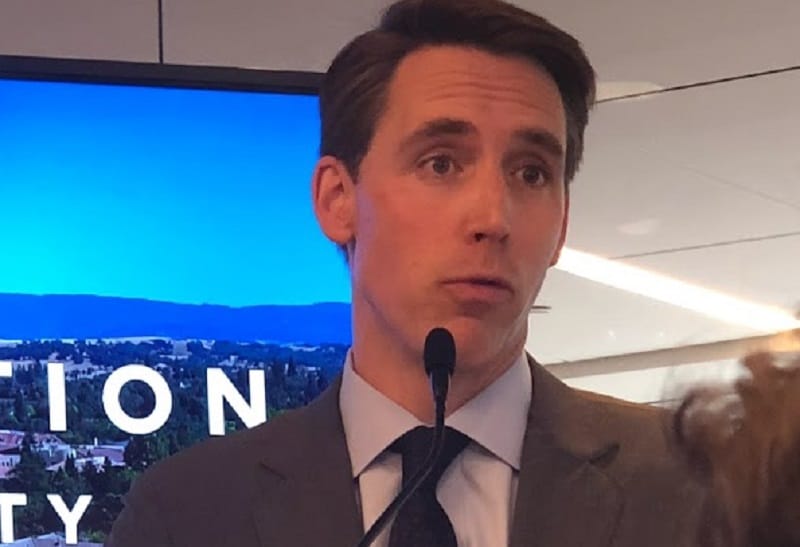Sen. Josh Hawley Speaks to the Snapchat Generation, Babysitting Them With 30 Minutes a Day on Social Media
WASHINGTON, August 1, 2019 — Sen. Josh Hawley, R-Mo., took the stage at the National Conservative Student Conference on Wednesday to thunderous applause and dozens of phones held in the air to capture his entry on Snapchat and Instagram. But Hawley, the youngest member of the Senate, is no friend to

WASHINGTON, August 1, 2019 — Sen. Josh Hawley, R-Mo., took the stage at the National Conservative Student Conference on Wednesday to thunderous applause and dozens of phones held in the air to capture his entry on Snapchat and Instagram.
But Hawley, the youngest member of the Senate, is no friend to social media. On Tuesday, he introduced a bill targeting “addictive” engagement practices by social media platforms including YouTube’s autoplay, Snapchat’s streaks, and Twitter’s infinite scroll. The legislation would, by default, limit a user’s daily time on a platform to 30 minutes.
When asked by a student at Wednesday’s conference how preventing tech companies from innovating would solve any of the important issues around big tech, Hawley pounced on the word “innovation.”
“My biggest critique of big tech—besides the fact that they want to shut down our speech, and besides the fact that they’ve gotten rich on taxpayer dollars, and besides the fact that they’ve got great inside deals from government, … my biggest critique of big tech is, what innovation have they really given us?” Hawley asked.
“We just celebrated the 50th anniversary of the moon landing. Think about what the tech sector gave to America in the decade of the 1960s.”
“And what is it now that in the last 15 or 20 years the people who say they’re the brightest minds in the country have given this country? What are their great innovations? Autoplay? Snap streak? Ever additional refinements of a behavioral ad-based platform?”
Ironically, earlier in his speech, Hawley declared that “it’s time that we stood up to big government, to the people in government who think they know better.”
The Social Media Addiction Reduction Technology Act (PDF) introduced this week by Hawley includes language that “automatically limits the amount of time that a user may spend on those platforms across all devices to 30 minutes a day unless the user elects to adjust or remove the time limit and, if the user elects to increase or remove the time limit, resets the time limit to 30 minutes a day on the first day of every month.”
Issues of Section 230 limitations of liability
Hawley also repeated the claims made in his proposed legislation to remove Section 230 protections from big tech platforms.
“It is time that these big companies who have gotten insider deals with the government are actually held accountable,” he said.
“No one has gotten more of a sweetheart deal from the federal government than the big technology companies—Facebook, Google, Twitter. They’re treated differently than any other platforms or publishers in America, …and they’ve gotten rich and powerful and profitable because of it.”
“Now they’re saying that they should be able to decide whether or not conservatives get to speak on their platforms—what conservative speech is acceptable and what isn’t,” Hawley continued.
“They now want to censor and sit in judgement on our political speech…if they’re going to get these special deals from government, that shouldn’t happen.”
Hawley acknowledged that Facebook, Google, and Twitter have all appeared in front of Congress and testified under oath that they never censor content based on political viewpoint. But if this is really true, he said, the companies should open their books to an audit to prove it.
At those hearings, others introduced testimony, including a survey conducted by the Economist that found no evidence that Google biases results against conservatives, and a data analysis released by Twitter that found no statistically significant difference between the number of times Tweets were viewed that were sent by Democratic and Republican members of Congress.
Sen. Marsha Blackburn, chair of the Judiciary Committee’s Tech Task Force, also spoke about alleged social media bias. She proposed a more cautious solution of “a framework to guide these platforms without dictating every single business decision.”
But her overall message was still that “it is time for big tech to become accountable for what they have done to conservative voices on the internet and on these social media platforms.”
(Photo of Sen. Josh Hawley in May 2019 by Drew Clark.)










